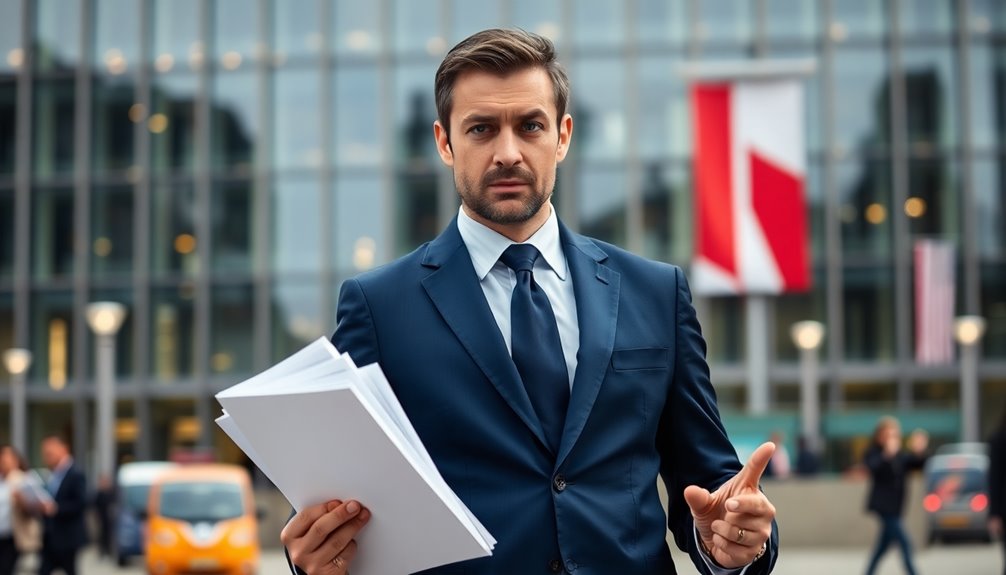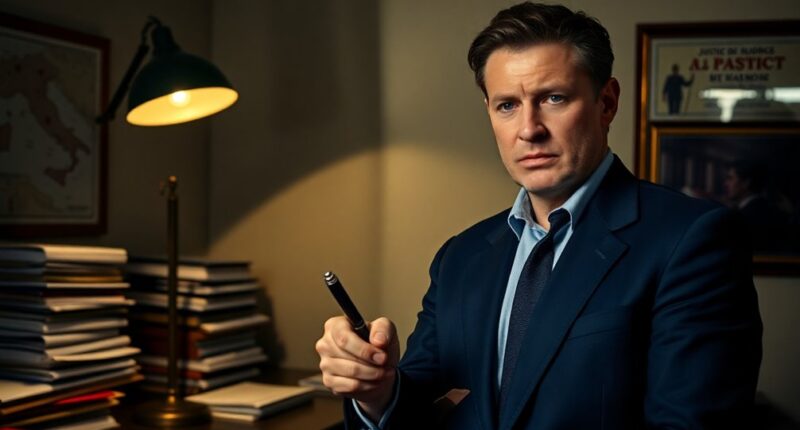Meet Giuseppe Antoci, the Brussels-based MEP who's fiercely battling the Mafia and organized crime in Europe. He's committed to protecting public funds and safety, using his Antoci's Protocol for rigorous background checks on EU fund applicants. After surviving an assassination attempt, he's grown more resolute in his mission. Collaborating with fellow MEPs, he's addressing gang violence and pushing for stronger EU law enforcement. There's much more to his story and the impact he's making in the fight against crime.
Key Takeaways
- Giuseppe Antoci is a Brussels-based MEP dedicated to combating organized crime, particularly targeting the Mafia dei Nebrodi.
- He survived an assassination attempt in 2016, underscoring the personal risks involved in his mission.
- Antoci created the Antoci's Protocol to ensure thorough background checks on EU fund applicants to prevent criminal exploitation.
- He actively collaborates with fellow MEPs and organizations to strengthen EU anti-Mafia initiatives and cross-border law enforcement cooperation.
- Public concern over gang violence is rising, fueling support for Antoci's efforts to transform public safety in Europe.

As the shadows of organized crime loom over Europe, Giuseppe Antoci, a Brussels-based MEP from Italy, stands at the forefront of the fight against the Mafia. His tenacity is evident in his efforts to target notorious organizations like the Mafia dei Nebrodi. Antoci's mission revolves around safeguarding European funds, which are often exploited by these criminal syndicates. To combat this, he developed Antoci's Protocol, ensuring thorough background checks for anyone applying for EU funds. His proactive approach reflects the urgency of protecting public resources from corruption.
However, the stakes are high for Antoci. After surviving an assassination attempt in 2016, his commitment to this cause has come with increased security measures. Yet, he doesn't shy away from the challenges. As a recipient of the Officer of Merit of the Italian Republic, his dedication to fighting organized crime has garnered recognition and respect. Holding various roles, including president of the Nebrodi Park, he's positioned himself as a key player in this ongoing battle. His collaboration with fellow MEPs and organizations strengthens the collective effort against criminal enterprises.
Antoci's resilience shines as he continues to combat organized crime, despite past threats to his life.
Currently, Antoci's work aligns with broader EU anti-Mafia initiatives. Reports from Europol indicate the infiltration of crime syndicates into the economy, a trend that raises alarms. The EU is making strides with laws like the European Arrest Warrant Act, which enhance cross-border law enforcement cooperation. Antoci actively supports these measures, seeking to transform his protocol into a model for anti-mafia initiatives while advocating harmonization in prison regulations and a public health approach to drug consumption.
As public concern about gang-related violence grows, especially in cities like Brussels, voter interest in anti-Mafia candidates has surged. Figures like Commission President Ursula von der Leyen echo the call to address organized crime, and the media's focus on Antoci's efforts underscores a collective yearning for a safer Europe. You can see how Antoci's grit is pivotal in this fight.
Frequently Asked Questions
What Inspired the MEP to Focus on Fighting the Mafia?
You might find that personal experiences often ignite a passion for justice.
For this MEP, witnessing the devastating impact of organized crime on communities and the economy fueled a commitment to fight back. Surviving threats and attacks only strengthened his resolve.
He recognized that tackling the mafia isn't just about enforcement; it's about protecting people's livelihoods and ensuring a safer future.
This mission drives him to advocate for stronger policies and international cooperation.
How Does the MEP Collaborate With International Law Enforcement Agencies?
When tackling the complex web of organized crime, you're not alone; you're teaming up with international law enforcement agencies.
By fostering collaboration through Eurojust and Europol, you're enhancing communication and strategic planning.
You're leveraging legal tools like the European Arrest Warrant to expedite justice.
Training law enforcement and sharing best practices are key to your approach, ensuring that every effort counts in the fight against transnational crime and its shadowy figures.
What Specific Legislation Has the MEP Proposed Against Organized Crime?
You'll find the MEP has proposed several key pieces of legislation against organized crime.
They've championed the EU Anti-Corruption Directive to boost transparency and accountability.
They're pushing for tighter background checks through the Protocol Antoci to keep organized crime out of legitimate businesses.
Additionally, they've advocated for enhanced Anti-Money Laundering Directives and stronger asset recovery measures, all aimed at disrupting mafia networks and protecting communities from their influence.
How Does the MEP Engage With Local Communities Affected by the Mafia?
Imagine a lighthouse guiding ships through stormy seas. That's how you can think of community engagement against the mafia.
To tackle the issue, you hold regular community meetings, listen to their concerns, and establish support groups for victims.
You collaborate with NGOs to enhance these initiatives and implement local feedback mechanisms, ensuring their voices are heard.
What Challenges Does the MEP Face in Combating Organized Crime Effectively?
You'll face numerous challenges in combating organized crime effectively.
Jurisdictional limits mean you often rely on member states for judicial policies, which can complicate cooperation. The need for international police collaboration adds another layer of complexity, especially with rival gangs in play.
Additionally, socioeconomic factors like inequality fuel organized crime, while public trust wanes amid visible violence.
Lastly, managing funding without inadvertently supporting criminal activities can be a tightrope walk.
Conclusion
As you witness the shadows of organized crime loom over Europe, remember the fierce light of this Brussels-based MEP. With grit in one hand and hope in the other, she stands at the frontline, battling the dark forces that threaten democracy. While the mafia thrives in secrecy, she shines a spotlight on corruption, turning fear into action. In this clash of shadows and light, her unwavering spirit ignites a movement, reminding us all that change is possible.









